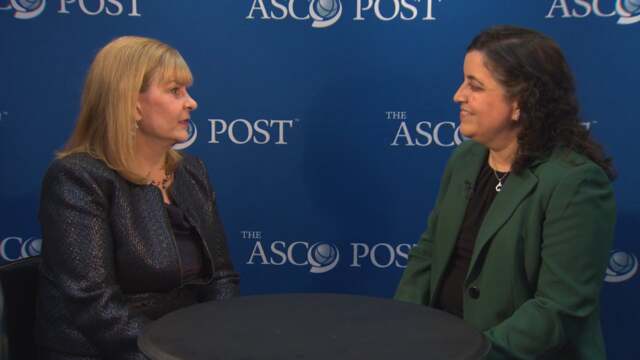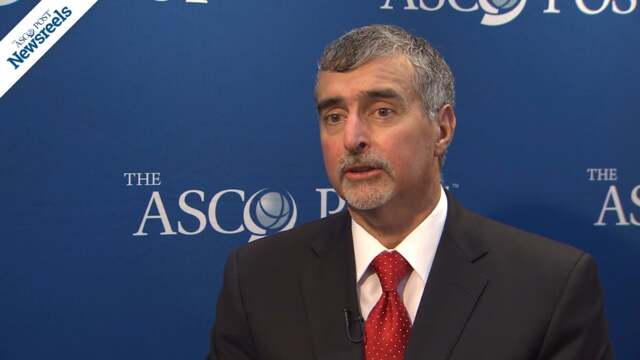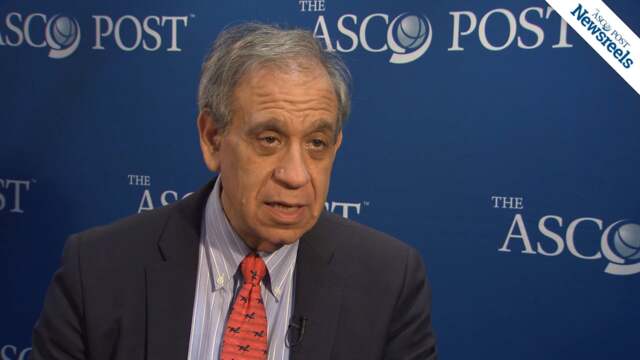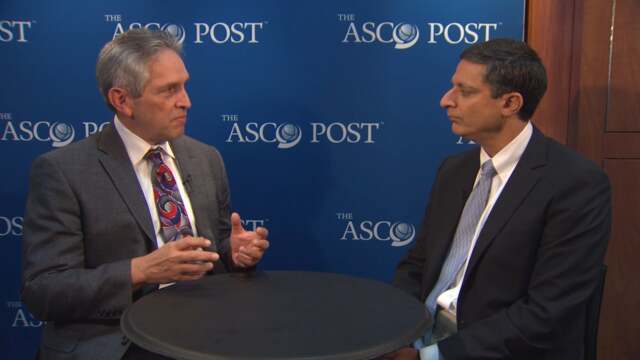Children, Parents Overreport Leukemia Treatment Adherence
New research suggests that young patients with acute lymphocytic leukemia (ALL) and their parents are likely to report to their physician that they took more of their anticancer medication than they actually did. The study, published by Landier et al in Blood, found that 84% of patients with ALL...
Adding Idelalisib to Bendamustine/Rituximab in Relapsed or Refractory Chronic Lymphocytic Leukemia
As reported by Zelenetz et al in The Lancet Oncology, an interim analysis of a phase III trial has shown the superiority of adding the phosphoinositide-3-kinase δ inhibitor idelalisib (Zydelig) to bendamustine/rituximab (Rituxan) in patients with relapsed or refractory chronic lymphocytic...
Postinduction MRD Predicts Outcome From Transplantation in NPM1-Mutant AML
In an analysis of a French trial reported in the Journal of Clinical Oncology, Balsat et al found that postinduction minimal residual disease was predictive of outcome and benefit from allogeneic stem cell transplantation (ASCT) in patients with NPM1-mutant acute myeloid leukemia (AML). Nicolas...
Retinoic Acid and Arsenic Trioxide vs Retinoic Acid and Chemotherapy in APL
As reported in the Journal of Clinical Oncology by Platzbecker et al, the final results of the Italian-German phase III APL0406 trial indicate that the combination of all-trans retinoic acid (ATRA) and arsenic trioxide (ATO [Trisenox]) is associated with better outcomes than standard ATRA plus...
High Financial Burden for CML Patients Enrolled in Medicare Part D Receiving Targeted Oral Therapy
In a study reported in the Journal of Oncology Practice, Shen et al found that more than three-quarters of patients receiving targeted oral therapy for chronic myeloid leukemia (CML) reached the catastrophic phase of the Medicare Part D benefit within the calendar year of starting such treatment....
Diagnosis and Management of AML in Adults: 2017 European LeukemiaNet Recommendations From an International Expert Panel
An international panel of experts has released updated evidence-based and expert opinion–based recommendations for the diagnosis and treatment of acute myeloid leukemia (AML) in adults. The recommendations were issued by the European LeukemiaNet (ELN) and published by Döhner et al in...
Three Genetic Alterations Identified in Non–Down Syndrome Pediatric Acute Megakaryoblastic Leukemia
Research led by St. Jude Children’s Research Hospital has identified three genetic alterations to help identify high-risk pediatric patients with acute megakaryoblastic leukemia (AMKL) who may benefit from allogeneic stem cell transplants. The study, published by de Rooij et al in Nature...
Androgen Maintenance in Elderly Patients With AML
The addition of norethandrolone as maintenance therapy improved survival in patients aged ≥ 60 years with acute myeloid leukemia (AML), according to a French phase III trial reported in the Journal of Clinical Oncology by Pigneux et al. Norbert Ifrah, MD, of CHU d’Angers, France, is the...
I’m Learning to Live With Chronic Cancer
I was feeling a bit more tired than usual as the Christmas holidays approached in December 2012, but I chocked it up to the frenetic pace of the season and keeping up with caring for my two young children, ages 4 and 12. I had none of the other typical warning signs of chronic myeloid leukemia...
Diamonds Are Forever, Tyrosine Kinase Inhibitors Are Not?
Sir Donald Munger: “You have been on holiday, I understand. Relaxing, I hope?” James Bond: “Oh, hardly relaxing, but most satisfying.” (Diamonds Are Forever) As tyrosine kinase inhibitors became the mainstay of therapy for patients with chronic myeloid leukemia (CML), our assumption has been that...
Safety of Stopping Imatinib in CML With Undetectable Minimal Residual Disease for at Least 2 Years
As reported in the Journal of Clinical Oncology by Gabriel Etienne, MD, PhD, of the Institut Bergonié, Bordeaux, and colleagues, long-term follow-up in the French Stop Imatinib (STIM1) study indicates that imatinib can be safely stopped in patients with chronic myeloid leukemia (CML) with...
Expert Point of View: Richard Furman, MD
“These results are interesting, important, and relevant for maintenance post chemotherapy, but if we are not using chemotherapy, they may not be relevant,” said Richard Furman, MD, of Weill Cornell Medical College, New York Presbyterian Hospital, New York. He said that newer drugs such as...
Lenalidomide Maintenance Extends Progression-Free Survival in CLL
Lenalidomide (Revlimid), a cornerstone of therapy for multiple myeloma in the modern era, is making headway as maintenance therapy in chronic lymphocytic leukemia (CLL). Separate phase III studies presented at the 2016 American Society of Hematology (ASH) Annual Meeting & Exposition showed...
Venetoclax Plus Rituximab Studied in Relapsed or Refractory Chronic Lymphocytic Leukemia
In a phase Ib study reported in The Lancet Oncology, Seymour et al found that the combination of the BCL2 inhibitor venetoclax (Venclexta) and the anti-CD20 monoclonal antibody rituximab (Rituxan) was highly active in patients with relapsed or refractory chronic lymphocytic leukemia...
Treating the Whole Person
Twenty-five years ago, I was a physically fit woman of 45 in training to run a marathon, which had been a lifelong goal. I was feeling fine and had no hint of the illness that would nearly take my life and has forever changed it. While ramping up to go the 26.2-mile distance, I decided to have a...
Expert Point of View: Armand Keating, MD
“This study shows that a great deal of innovation can come from existing knowledge. The 7+3 regimen has been around since I was an intern,” admitted Armand Keating, MD, of the University of Toronto and Princess Margaret Hospital, Toronto, Ontario, Canada. “Using the liposomal formulation of...
CPX-351 Improves Survival Post Transplant in Older High-Risk Patients With Acute Myeloid Leukemia
Induction therapy with the experimental chemotherapy called CPX-351—a liposomal formulation of cytarabine and daunorubicin—outperformed standard “7+3” cytarabine plus daunorubicin by extending survival in older high-risk patients with acute myeloid leukemia (AML) who subsequently underwent...
Expert Point of View: Mikkael A. Sekeres, MD, MS
Mikkael A. Sekeres, MD, MS, Director of the Leukemia Program at the Cleveland Clinic Taussig Cancer Center in Ohio, commented on vadastuximab talirine in newly diagnosed acute myeloid leukemia (AML). He noted that the drug is similar to gemtuzumab ozogamicin, another antibody-drug conjugate that...
Vadastuximab Talirine Shows Early Promise in Newly Diagnosed Acute Myeloid Leukemia
The investigational CD33-directed antibody-drug conjugate vadastuximab talirine yielded high overall and complete response rates when combined with standard “7+3” chemotherapy for patients newly diagnosed with acute myeloid leukemia.1 Results from this phase Ib study were presented at the 2016...
Expert Point of View: Amir T. Fathi, MD
“In the past few years, there has been increased reporting of other, less traditional, response criteria in acute myeloid leukemia (AML), including morphologic leukemia-free state, partial response, and complete remission [or complete response] with incomplete recovery. There is some concern that...
Achieving Complete Response Is Key to Improving Survival in Older Patients With AML
The importance of achieving complete response after intensive therapy in older adults with acute myeloid leukemia (AML) was confirmed in a follow-up analysis of the E2906 North American Intergroup trial.1 Patients in complete response had superior survival in this landmark analysis. This finding...
Expert Point of View: Mikkael Sekeres, MD
In his practice, Mikkael Sekeres, MD, of the Cleveland Clinic Foundation, has not initiated dose reductions of tyrosine kinase inhibitors, but “anecdotally, my patients tell me that they have reduced the dose. Many of them cannot afford to continue treatment indefinitely, and some have side...
Reducing Doses and Stopping Tyrosine Kinase Inhibitors Gain Favor in Chronic Myeloid Leukemia
Tyrosine kinase inhibitors, such as imatinib, nilotinib (Tasigna), and dasatinib (Sprycel), have revolutionized the treatment of chronic myeloid leukemia (CML). A substantial percentage of patients achieve deep and meaningful remissions on these agents. More recently, partly driven by patients’ and ...
Expert Point of View: Stephen P. Hunger, MD
Stephen P. Hunger, MD, Chief of the Division of Pediatric Oncology and Director of the Center for Childhood Cancer Research at The Children’s Hospital of Philadelphia, and the Jeffrey E. Perelman Distinguished Chair in the Department of Pediatrics at the University of Pennsylvania, Philadelphia,...
Reduced-Intensity Chemotherapy Leads to More Relapses in Childhood ALL
Children with acute lymphoblastic leukemia (ALL) considered at standard risk for relapse should continue to receive standard-intensity regimens, according to findings from the international randomized AIEOP-BFM ALL 2000 trial.1 A reduced-intensity treatment for children with ALL considered to have ...
ASH 2016: Children With Down Syndrome and ALL Fare as Well as Other Children Treated on ALL Consortium Protocols
Despite an elevated risk of toxicity from chemotherapy, children with Down syndrome and acute lymphoblastic leukemia (ALL) did not experience higher rates of relapse or treatment-related mortality compared with other children treated on Dana-Farber Cancer Institute ALL Consortium Protocols,...
ASH 2016: Ibrutinib and TGR-1202 Combination Yields Encouraging Results in Patients With Relapsed Forms of Leukemia or Lymphoma
A combination of two targeted agents has demonstrated safety as well as encouraging signs of effectiveness in a phase I clinical trial in patients with relapsed or hard-to-treat chronic lymphocytic leukemia (CLL) or mantle cell lymphoma (MCL). Davids et al reported the findings at the 58th American ...
ASH 2016: IKZF1 Gene Mutations Found to Increase Hereditary Risk for Acute Lymphocytic Leukemia in Children
A late-breaking abstract being presented by Churchman et al during the 58th American Society of Hematology (ASH) Annual Meeting & Exposition in San Diego (Abstract LBA-2) identifies inherited genetic mutations in the gene IKZF1 that confer a higher likelihood of developing pediatric...
Martin Schrappe, MD, on Childhood ALL: Study Results on Reducing Treatment Burden (German Language Version)
Martin Schrappe, MD, of Christian-Albrechts University Kiel, discusses in German study findings on reduced intensity delayed intensification in standard-risk patients defined by minimal residual disease in childhood acute lymphoblastic leukemia (Abstract 4).
Julie Vose, MD, MBA, and Anjali Advani, MD, on AML: Results of Two Trials on Vadastuximab Talirine
Julie Vose, MD, MBA, of the University of Nebraska Medical Center, and Anjali Advani, MD, of the Cleveland Clinic, discuss study findings on vadastuximab talirine as monotherapy and, in another trial, vadastuximab talirine plus hypomethylating agents in older patients with AML (Abstracts 590, 591).
Julie Vose, MD, MBA, and Mhairi Copland, MB, ChB, PhD, on CML: Data From the British DESTINY Study
Julie Vose, MD, MBA, of the University of Nebraska Medical Center, and Mhairi Copland, MB, ChB, PhD, of the Paul O’Gorman Leukaemia Research Centre at the University of Glasgow, discuss decreasing the dose of tyrosine kinase inhibitors in CML patients with stable molecular responses (Abstract 938).
Harry P. Erba, MD, PhD, on AML: Early Study Results on Vadastuximab Talirine
Harry P. Erba, MD, PhD, of the University of Alabama at Birmingham, discusses phase Ib findings on vadastuximab talirine in combination with 7+3 induction therapy for patients with newly diagnosed AML (Abstract 211).
Jeffrey E. Lancet, MD, on AML: Subgroup Analysis of a Phase III Trial
Jeffrey E. Lancet, MD, of the H. Lee Moffitt Cancer Center and Research Institute, discusses study findings on survival following allogeneic hematopoietic cell transplantation in older, high-risk acute myeloid leukemia patients initially treated with CPX-351 liposome injection vs standard cytarabine and daunorubicin (Abstract 906).
Terry J. Fry, MD, on ALL: MRD and CAR Therapy
Terry J. Fry, MD, of the Pediatric Oncology Branch of the National Cancer Institute, discusses minimal residual disease–negative complete remissions following anti-CD22 chimeric antigen receptor in children and young adults with relapsed/refractory acute lymphoblastic leukemia (Abstract 650).
Martin Schrappe, MD, on Childhood ALL: Study Results on Reducing Treatment Burden
Martin Schrappe, MD, of Christian-Albrechts University Kiel, discusses study findings on reduced intensity delayed intensification in standard-risk patients defined by minimal residual disease in childhood acute lymphoblastic leukemia (Abstract 4).
ASH 2016: Interim Analysis Shows Adding Lenalidomide Maintenance Therapy to Chemoimmunotherapy Prolongs Progression-Free Survival in High-Risk CLL
The combined use of genetic markers and minimal residual disease assessment (MRD) has made it easier to identify chronic lymphocytic leukemia (CLL) patients likely to have a poor outcome after receiving frontline chemoimmunotherapy. Interim results from the phase III German CLL M1 study presented...
ASH 2016: CD19-Targeting CAR T-Cell Immunotherapy Yields High Response Rates in Treatment-Resistant CLL
In a small, early phase trial, a high percentage of patients who had exhausted most traditional treatments for chronic lymphocytic leukemia (CLL) saw their tumors shrink or even disappear after an infusion of a highly targeted, experimental chimeric antigen receptor (CAR) T-cell immunotherapy...
Smita Bhatia, MD, MPH, and Jessica Wu, BA, on CML: A Report From the Bone Marrow Transplant Survivor Study
Smita Bhatia, MD, MPH, and Jessica Wu, BA, both of the University of Alabama at Birmingham, discuss long-term morbidity and mortality experienced by chronic myeloid leukemia patients after allogeneic hematopoietic cell transplantation (Abstract 823).
Syed A. Abutalib, MD, and Nelli Bejanyan, MD, on Adult ALL and Consolidation Chemotherapy: Results From a CIBMTR Study
Syed A. Abutalib, MD, of Cancer Treatment Centers of America, and Nelli Bejanyan, MD, of the University of Minnesota, discuss findings from a study conducted by the Center for International Blood and Marrow Transplant Research on treatment for ALL patients, with an available donor, undergoing myeloablative allogeneic hematopoietic cell transplantation in first complete remission (Abstract 684).
Andrew D. Zelenetz, MD, on CLL: Emerging Treatments
Andrew D. Zelenetz, MD, of the Memorial Sloan Kettering Cancer Center, discusses novel treatments for chronic lymphocytic leukemia, touching specifically on the Gilead 115 trial.
Jose F. Leis, MD, PhD, and Sagar Lonial, MD, on CLL: Ibrutinib Insights
Jose F. Leis, MD, PhD, of the Mayo Clinic, and Sagar Lonial, MD, of Emory University, discuss a session on CLL treatment (excluding transplantation): ibrutinib resistance, transformation, and cellular therapy.
ASH 2016: Patients With CML and Stable Molecular Responses May Be Able to Safely Decrease the Dose of Their Tyrosine Kinase Inhibitor
A study led by researchers at the University of Liverpool presented by Clark et al at the 58th American Society of Hematology (ASH) Annual Meeting & Exposition (Abstract 938) suggests many patients with chronic myeloid leukemia (CML) may be able to safely reduce tyrosine kinase inhibitor side...
ASH 2016: Cessation of Tyrosine Kinase Inhibitor Treatment in Chronic Myeloid Leukemia Patients With Deep Molecular Response
In one of the largest-ever trials to assess the safety of stopping tyrosine kinase inhibitor therapy—the Euro-Ski trial—about half of 821 patients with chronic myeloid leukemia (CML) showed no evidence of relapse 2 years after treatment cessation, suggesting that some patients can...
ASH 2016: Phase I Trial of Vadastuximab Talirine in Combination With 7+3 Induction Therapy for Patients With AML
In a clinical trial presented by Erba et al at the 58th American Society of Hematology (ASH) AnnualMeeting & Exposition (Abstract 211), vadastuximab talirine was found to be safe when used in combination with standard chemotherapy treatment for patients with acute myeloid leukemia (AML). The...
ASH 2016: Study Shows Patients Traditionally Ineligible for Studies May Benefit From Trial Participation
Patients who potentially could benefit most from participation in clinical trials due to poor prognoses often are not included based on eligibility criteria, such as existing medical illnesses. A novel study at The University of Texas MD Anderson Cancer Center revealed some patients with acute...
ASH 2016: Biomarker May Predict Which Patients Previously Treated for Cancer Will Develop Highly Fatal Form of Leukemia
Patients successfully treated for breast, colon, and other cancers can go on to develop an often-fatal form of leukemia, sometimes years after completion of treatment, due to a genetic mutation leading to secondary malignancies known as therapy-related myeloid neoplasms. A study conducted by...
ASH 2016: New CAR T-Cell Therapy Holds Promise for Children and Young Adults With Hard-to-Treat ALL in Phase I Trial
Children and young adults with relapsed or refractory acute lymphoblastic leukemia (ALL) who receive chimeric antigen receptor (CAR) T-cell therapy targeting CD22, a protein found on the surface of leukemic cells, appear to mount a clinical response and, in some cases, achieve remission....
ASH 2016: New Chemotherapy Delivery Method Improves Survival After Bone Marrow Transplant in Older Patients With AML
A new analysis presented by Lancet et al at the 58th American Society of Hematology (ASH) Annual Meeting & Exposition (Abstract 906) found older patients with acute myeloid leukemia (AML) survived longer after receiving an allogeneic stem cell transplant if they were first treated with the...
High Frequency and Poor Outcome of Philadelphia Chromosome–Like ALL Reported in Adults
In a study reported in the Journal of Clinical Oncology, Roberts et al found a high frequency of Philadelphia chromosome (Ph)–like acute lymphoblastic leukemia (ALL) in adults with B-cell ALL and poorer outcome with conventional therapy in these patients. Frequency of Disease The frequency...
FDA Grants Full Approval and Label Update for Ponatinib in CML and ALL
The U.S. Food and Drug Administration (FDA) has granted ponatinib (Iclusig) full approval for the treatment of adult patients with chronic-phase, accelerated-phase, or blast-phase chronic myeloid leukemia (CML) or Philadelphia chromosome–positive acute lymphoblastic leukemia (ALL) for whom no ...











